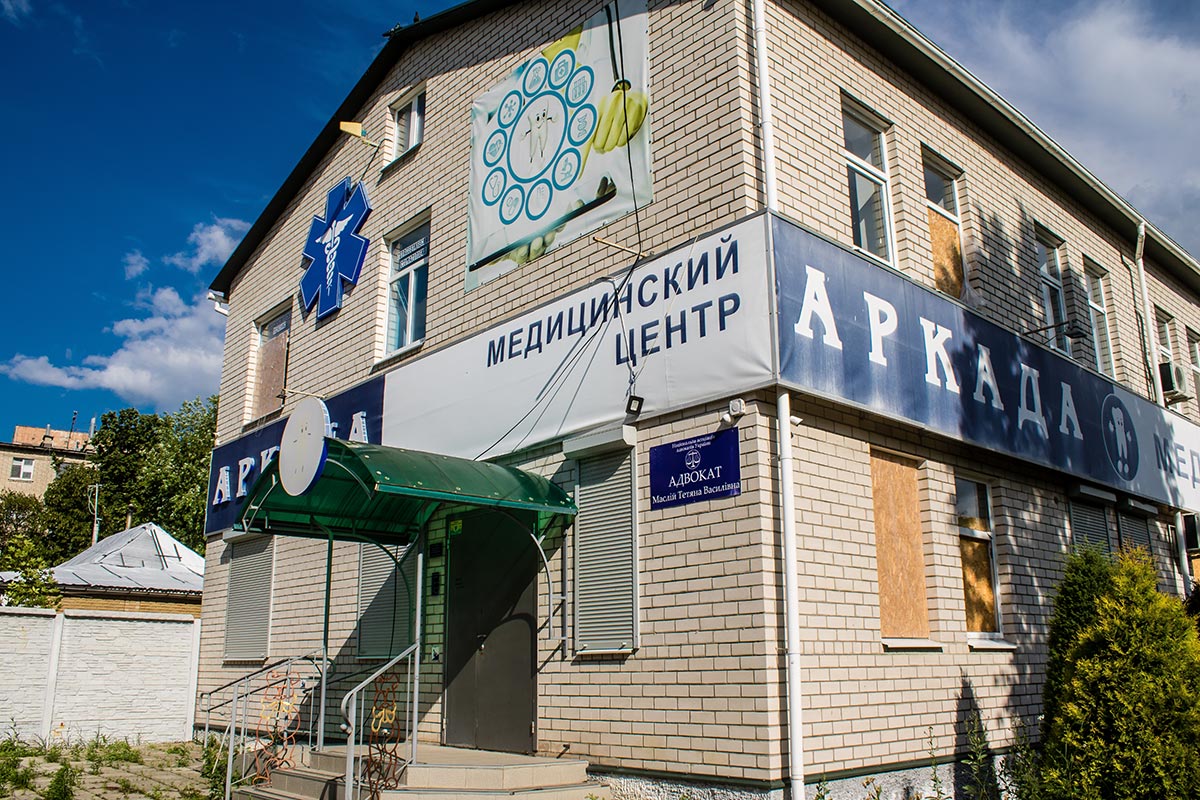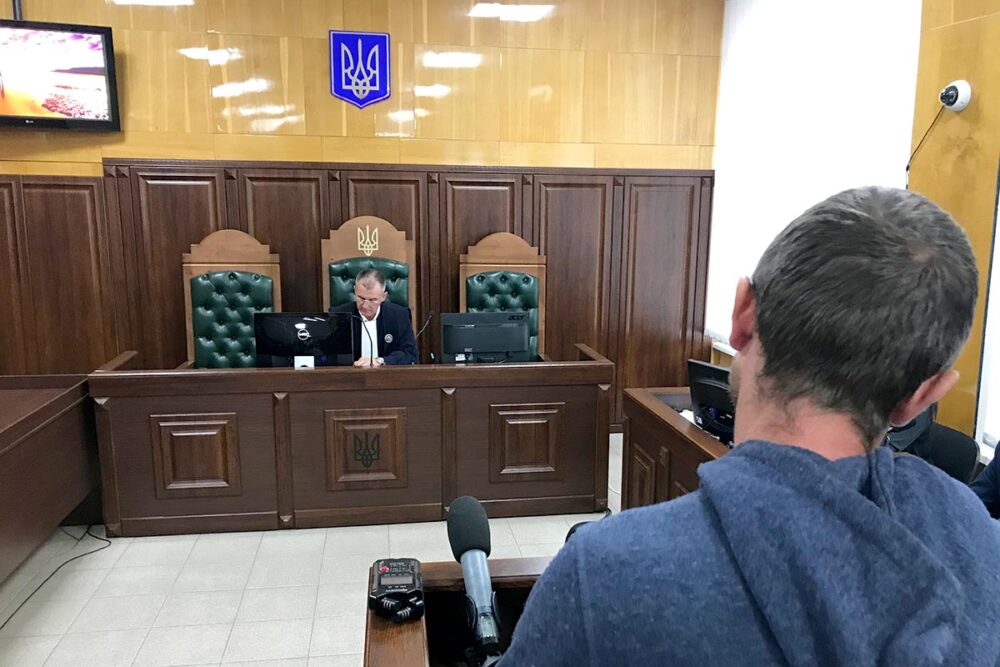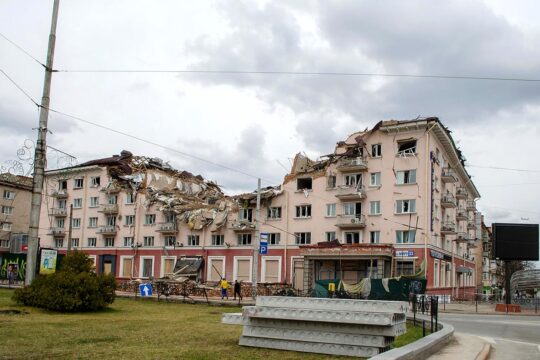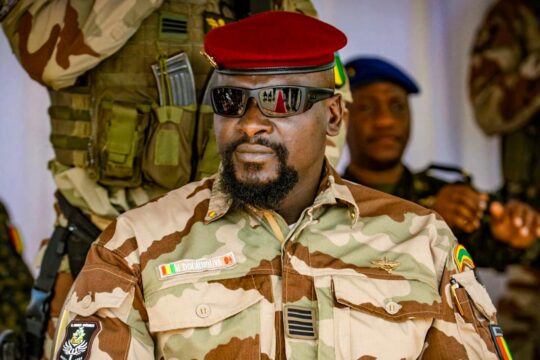After the Russian Federation's full-scale invasion of Ukraine, any economic engagement with the aggressor was prohibited. At the same time, a lot of people who suddenly found themselves under occupation in early 2022 had to make a choice: to evacuate – thus abandoning their long-standing, hard-earned business and well-established team – or to try and save at least something from being looted by the Russians while waiting for de-occupation. After the liberation of the invaded territories, many of the latter faced criminal prosecution.
The Criminal Code of Ukraine (CCU) has a wide range of articles prescribing criminal responsibility for financial collaboration or material assistance to the aggressor. In other words, almost the same offence is stipulated in various articles of the CCU. For example, the articles on financing terrorism or participation in a terrorist organisation stipulate prosecution for providing funds or assistance to a terrorist organisation. In early 2022, two new articles were amended to the CCU: on collaboration and abetting the aggressor state. Both also refer to assistance to the aggressor, including financial aid. Part 4 of Article 111-1 of the CCU on collaboration includes providing material resources to the occupiers and/or engaging in economic activities through cooperation with the aggressor state or illegal authorities established in the temporarily occupied territory, including the occupation administration of the aggressor state. These offences are subject to a fine or imprisonment for 3 to 5 years. A person may also be prohibited from holding certain positions for 10 to 15 years with confiscation of property. Under Article 111-2 on abetting the aggressor state, which also stipulates the provision of material resources, a person may be imprisoned for 10 to 12 years and prohibited from engaging in certain activities for 10 to 15 years with confiscation of property.
We decided to analyse the case law on economic collaboration, which has the most defined elements on such offence.
The Register of Court Decisions revealed that between March 2022 and September 2024, Ukrainian courts have already issued more than 80 verdicts under Article 111-1(4) of the CCU. In 2022, the Register made public 20 verdicts under this provision; in 2023 there were 42, and by September 2024 there were an additional 19.
Here are some of the most striking examples from the reviewed verdicts.
Selling meteorological equipment to Russia
On July 17, 2024, the Frankivsk District Court of Lviv sentenced Roman Dubil, co-founder of Tekhprylad. The company manufactures and sells hydrometeorological equipment for measurements, research and navigation.
According to the case file, the company had been collaborating with the Russian company Monolit since 2014, supplying it with equipment. After the full-scale invasion of Russia, despite the prohibition imposed by the government and the National Bank on economic ties with the aggressor, the company continued its collaboration. The investigation established that the accused had organised a fraudulent scheme to deliver the merchandise to Russia. The equipment was allegedly purchased by a Turkish company through a transport company in Bulgaria. The actual consignment was to Russia.
In total, the Ukrainian company sold over $800,000 worth of equipment to Russia between 2022 and 2023. The Russian company, for its part, cooperated with other state-owned companies and institutions of the Russian Federation and paid taxes to the Russian state budget.
The accused repented and signed a plea deal with the prosecution.
Interestingly, the prosecutor in this case stated in court that the company managed by the accused plays an important role in Ukraine's defence sector, as it produces, among other things, equipment used in the defence of Ukraine. The prosecutor asked the court not to impose an additional sanction on the accused – prohibition from business activities and confiscation of property. This would make it impossible for the company to carry out its work, disrupt the manufacturing processes that the accused has been managing for many years, and lead to downtime and loss of experienced staff involved in manufacturing. The company would also be unable to manufacture supplies essential for Ukraine in the context of this war.
The court accepted the prosecutor's arguments and approved the plea deal. Roman Dubil was only sentenced to a fine of 170,000 Ukrainian Hryvnia (about $4100).
Handing over a tractor and car keys
Yurii Lynnyk from the Kharkiv oblast and Andrii Pokusay from the Kyiv oblast received the same fines but were also prohibited from holding public office positions and faced confiscation of their property. Unlike Dubil they committed the alleged offences during the occupation.
According to the case file, in March 2022 Russians occupied the village of Hlibivka, Vyshhorod district, Kyiv oblast. Six soldiers detained Pokusay and seized his car. Later, they drove him to some villagers to extort their vehicle. On that occasion, Pokusay asked the villagers to hand him over the keys.
The man admitted these circumstances and pleaded guilty. As the victims testified in court, they saw Pokusay among Russians, and he repeated their demand to hand them over the keys. The investigation insisted that the man had done so in order to be treated favourably by the Russians. However, it is not clear from the text of the verdict whether he actually had a privileged status among the occupiers. The court also did not investigate whether he was acting under coercion. The detailed position of the defence is not stated in the verdict.
The court sentenced Pokusay to a similar fine of UAH 170,000 and prohibited him from holding positions in local government and state authorities for 10 years. However, the court agreed to his request and confiscated only his possessions, allowing him to keep his house and his land parcel. The court took into account that the accused had a serious illness.
Lynnyk was the head of security at an agricultural company in the Kupiansk district, Kharkiv oblast. According to the investigation, during the occupation in March 2022, he voluntarily handed over the warehouses and equipment of an agricultural company to the Russian military for ideological reasons. The man repented and signed a plea deal with the prosecution. Under the agreement, he accepted the offered sentence of a fine. The court eventually approved the plea deal in the presence of the defence lawyer and sentenced the man to a fine of UAH 170,000 and a prohibition from working in state authorities for 11 years. The court also ruled to confiscate his property.
As we can see, a fine can be imposed both for a multi-thousand dollars scheme of illegal trade with the aggressor and a one-time supply of material resources during the occupation. Also, it is clear from the mentioned verdicts that the court did not investigate whether people acted under coercion. Instead, the accused signed plea deals with the prosecution, which resulted in quick trials.
A medical centre under occupation
Valentyna Kobeleva is the owner of Arkada, a private medical centre located in the Kupiansk district, Kharkiv oblast. She was also an elected member of the Kupiansk City Council. According to the case file, during the occupation in 2022 she continued the centre’s work and registered it with the tax office of the occupation authorities.
The woman pleaded guilty. She told the court that her centre had been running for over 20 years and had a large staff of doctors. After the full-scale invasion, the centre did not work for several days. But later, people started coming with health complaints, since by that time the state clinic was already closed. So, the woman decided to continue providing medical care. According to her statement, in June 2022 representatives of the occupation authorities started insisting on registering her business with their tax office and threatened to confiscate everything. She eventually had to sign the documents, but did not pay taxes to the Russian state budget. She explained that she feared for her life and her staff. Her lawyer also pointed out that she was unable to leave the occupied city. Yet the court did not take this information into account, as other locals had managed to evacuate.
Witnesses, including colleagues and local villagers, confirmed that the Arkada Centre had been working during the occupation and that the Russians had insisted that the owner register it under their legislation. Witnesses also explained that medical facilities and pharmacies were closed during the occupation.

Can you provide medical care without managers?
The court found Kobeleva guilty and sentenced her to 3 years imprisonment. It also prohibited her from engaging in business activities for 10 years and confiscated her property. The case was scheduled for an appeal hearing. Both the defence and the prosecutor filed the appeal.
“International Humanitarian Law states that medical professionals are fully protected from criminal prosecution for their work in the occupied territory,” comments Andrii Yakovlev, a lawyer and expert on international law. “Doctors are the only category that cannot be prosecuted. Of course, the investigation claims that the case is about the head of a medical institution, a manager. But it often happens that a doctor is the head of an institution. And then, I honestly believe that the concept of medical personnel should be considered in a broader context and in the light of the current reality.” He reminds that the UN Human Rights Monitoring Mission indicated that basic services should be provided to the population in the occupied territories. Medical care is one of these services.
“Let's think about whether it is possible to provide medical care without management and hospitalisation. In other words, a doctor cannot provide care if the hospital is not managed by someone who insures heating or lighting. When we bring to justice the heads of medical institutions or owners of medical businesses that provide basic care, we are in fact prohibiting any medical activity in the occupied territory,” Yakovlev says.
Running a commercial centre
Serhii Ganus from Kupiansk was a private entrepreneur selling household products and food. His commercial centre, which had five warehouses, employed about 50 people since 2005. According to the investigation, in 2022, after the city was occupied, he engaged in business with Russians. He got registered with their tax office and sold products from Belarus and the so-called “Donetsk People’s Republic” (DNR), a part of Eastern Ukraine controlled by separatists supported by Russia.
The man told the court that, after the Ukrainian-made merchandise was out of stock, he imported food from DNR and Belarus. He explained that he allowed people to pay in both hryvnias and rubles. During this period, his company had about 20 employees. He said that the representatives of the occupation administration forced him to get a business licence issued by them. In case of refusal, they threatened to put him in the basement. He insisted that he continued to work during the occupation so that the people who remained in Kupiansk had food and basic supplies. He also provided them with humanitarian aid. He planned to leave the city with his wife after clearing the stock of the merchandise.
Among the witnesses at the trial were employees of the commercial centre and local residents. The security guard of the centre said that the accused had opened the commercial centre at the request of the staff. He confirmed that they were selling Ukrainian goods and sometimes imported Russian ones. People were allowed to pay in hryvnias. Russian soldiers also came to buy goods and paid in rubles. According to witnesses, the centre’s owner sometimes distributed food to the locals and permitted them to charge their phones from the generator.
The court sentenced the man to 3 years in prison, prohibited him from engaging in commercial activity for 10 years and confiscated his property. The case was appealed. The prosecutor asked for a more severe sentence of 5 years in prison, and the defence asked for a reduced sentence. On August 19, 2024, the Kharkiv Court of Appeal changed the court’s verdict and sentenced Ganus to a fine of UAH 170,000 instead of imprisonment.
Business in the self-proclaimed DNR
There are many cases of business owners who were trading with the so-called “DNR” even before the full-scale invasion. On July 10, 2024, the Shevchenkivskyi District Court of Kyiv sentenced Volodymyr Nosachov, co-owner of the Sonico-Svyaz telecommunications provider. The investigation established that the company had been operating in Donetsk since 1998. When the city was overrun by the separatists, the company continued to function, and after 2022, it registered with the Russian tax office. The occupation authorities were among the provider's clients.
Nosachov pleaded guilty. He signed a plea deal with the prosecutor's office. As part of the agreement, he pledged to pay UAH 1 million (24,200 dollars) to the Ukrainian Armed Forces through a special account of the National Bank and agreed to a 5-year suspended sentence. The court approved this agreement. The probationary period is 2 years. Nosachov was also prohibited from holding senior positions in business organisations for 10 years.
Some of the trends in court verdicts
After reviewing dozens of sentences issued by the courts for economic collaboration between 2022 and 2024, we identified the most common trends and jointly studied them with an expert to assess their compliance with international humanitarian law.
We noticed that in early 2022, when cases under Article 111-1(4) of the Criminal Code on economic collaboration started to be submitted to the courts, most of them concerned relatively minor violations. They mainly involved the occupied territories of the Sumy oblast, where citizens supplied food, alcohol or cigarettes to the Russian military. The majority of the accused pleaded guilty and walked out with small fines.
Another trend concerned the cases’ consideration against the accused who live in the temporarily occupied Ukrainian territories. In most of the proceedings in absentia, the courts sentenced the accused who provided material resources to the occupiers or were in charge of companies controlled by the Russians to the highest penalty stipulated by the article. And while their imprisonment remains uncertain, as these people may leave for Russia, the confiscation of their property would be possible after a de-occupation of Ukrainian territories.
The plan after
How to achieve a balance between protecting national security and avoiding a disastrous effect on the economy by putting all businessmen from the occupied territories behind bars? What about Ukraine's plans to de-occupy all territories, including those occupied since 2014? Yakovlev believes that the state should ensure a certain transitional period. “After 2014, when Russia started its aggression, it was morally difficult to cooperate with it, and many refused such collaboration. But there was no prohibition. However, since March 2022, a total prohibition is in place. Continued cooperation is subject to criminal responsibility,” he points out. “Now let's think about the merits of this article from the point of view of a business with a large staff and a certain manufacturing capacity. At one point, the state says that such business should be shut down. At the same time, it does not stipulate any transitional period for the company to be liquidated or changed. As a result, everything has to be closed. But it doesn't work that way in business. After all, some reports are submitted within specific periods, employees must be fired following legal procedures, and salaries must be paid.” According to him, it is worth borrowing from the experience of other states that have faced occupation in the past. Perhaps, instead of mandatory criminal prosecution, certain lustration measures should be introduced, such as restricting the right to hold positions in government or requiring a declaration of collaboration with the enemy.
This report is part of our coverage of war crimes justice produced in partnership with Ukrainian journalists. A first version of this article was published on the « Gre4ka » website.







